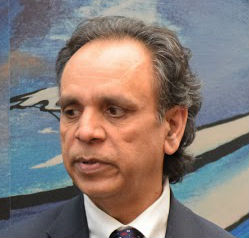The One Marketing Lesson That Hasn’t Changed
By Upendra Mishra
BOSTON–In a world overflowing with AI tools, infinite data, and non-stop digital innovation, it can feel like everything about marketing has changed. But one timeless idea still stands as a compass for marketers and leaders alike: Theodore Levitt’s Marketing Myopia.
Written in 1960, its core message is more relevant today than ever: people don’t buy products — they buy solutions to their problems.
Levitt’s key insight? Companies don’t fail because markets disappear — they fail because they define themselves too narrowly. Railroads declined not because people stopped needing transportation, but because railroad executives thought they were in the railroad business — not the transportation business. The same happened when Hollywood viewed television as a threat rather than an opportunity.
This is the danger of myopia: focusing on what you make instead of why it matters to the customer.
Levitt draws a powerful distinction between selling and marketing. Selling is about pushing what you’ve already built. Marketing is about understanding what customers truly need — and building your business around that insight.
And here’s where it gets even more radical: Marketing is not a department. It’s the business.
Companies shouldn’t see themselves as producers of goods, but as creators of customers. Everything — from product design to customer service — should flow from that mindset. Marketing isn’t something you layer on at the end. It’s the foundation.
Levitt writes: “An industry begins with the customer and their needs. It does not begin with a patent, a raw material, or a selling skill.”
And that changes everything. The job of a business isn’t just to make things — it’s to win and keep customers. That means marketing is everyone’s job. Every team, every decision, every touchpoint should reflect a deep understanding of the customer.
But insight alone isn’t enough. Levitt argues that avoiding myopia requires visionary leadership — people who champion a customer-first mindset across the entire organization. Without that vision, companies drift, blinded by past successes.
As Levitt warns: “If an organization does not know or care where it is going, it does not need to advertise that fact with a ceremonial figurehead. Everybody will notice it soon enough.”
In today’s terms, that vision might look like being user-centric, experience-first, or purpose-driven. But the heart of it remains unchanged: understand your customer better than anyone else — and align your business to serve them.
So what does all this mean in the age of AI and algorithms?
It means Marketing Myopia matters more than ever.
Sure, big data shows us what people do — but not why. Machine learning can predict behavior — but not the emotions behind it. Automation can scale outreach — but it can’t build trust.
In a world where every company has access to the same tools, customer understanding is the only sustainable advantage.
And that’s the enduring truth.
The platforms may have changed. The expectations have accelerated. But the fundamentals of marketing — empathy, clarity, and a deep obsession with solving real problems — are more essential now than ever.
Because marketing, done right, isn’t about pushing products. It’s about building relationships. Creating customers. And ensuring your business doesn’t just survive — but thrives.
(Upendra Mishra is the author of Precise Marketing: The Proven System for Growing Revenue in a Noisy World and Presodemt of The Mishra Group, a Boston-based marketing consultancy helping organizations drive sustainable growth through strategic clarity and customer-centric execution.”





